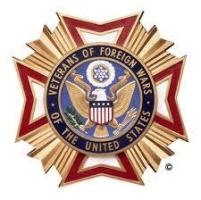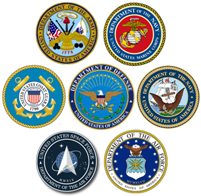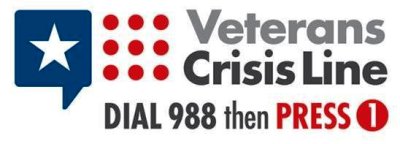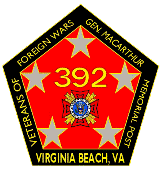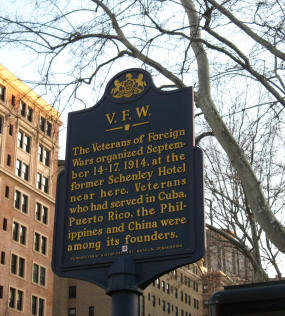
Mission
The VFW is an organization of war veterans committed to ensuring rights, remembering sacrifices, promoting patriotism, performing community services and advocating for a strong national defense.
Origin
The VFW was established September 29, 1899, when a small group of
Spanish-America war veterans banded together to create one voice on
behalf of all American veterans. Though the founders of this phenomenal
organization are no longer with us, the strength and legacy they left
behind has endured for the past 116 years.
In 1899 the American Veterans of Foreign Service (Columbus, OH) and the National Society of the Army of the Philippines (Denver, CO) were organized to secure rights and benefits for veterans of the Spanish-American War (1898) and the Philippines War (1899-1902). These two organizations merged in 1914, creating the Veterans of Foreign Wars of the United States. The VFW was chartered by Congress in 1936.
Organizational Structure
Thousands convene each August at VFW's national convention to elect officers, adopt resolutions and discuss business affairs. Leading the organization are the elected commander-in-chief, senior vice commander-in-chief, and junior vice commander-in-chief. The National Council of Administration serves as the VFW's board of directors.
More than 9,000 Posts comprise 54 Departments in the 50 United States, the District of Columbia, Latin America, the Pacific Areas, and Europe. Individual Posts form the basic local chapter, such as our post, VFW Post 392. We are a member of VFWVA District 2. Our current District 2 Commander is a VFW Post 392 member.
Partner Organization
A national volunteer service organization, the Ladies Auxiliary of the VFW was founded in 1914 and is the backbone of many local VFW volunteer efforts. In 2015, the Ladies Auxiliary was officially renamed the VFW Auxiliary, allowing the membership of the many male spouses of our veteran membership. You can access the VFW National Auxiliary Page by clicking on their logo at the top of this page.
The VFW Buddy Poppy™
From its inception, the Buddy Poppy Program has
helped the VFW live up to its motto, "to honor the dead by helping the
living." The Buddy Poppy - small red flower symbolic of the blood shed
in World War I by millions of Allied soldiers in defense of freedom –
was originally sold to provide relief for the people of war devastated
France. Later, its sale directly benefited thousands of disabled and
down-and-out American veterans.
The poppy program actually got its start on the other
side of the Atlantic Ocean. Shortly after World War I, Madame E. Guerin,
founder of the American and French Children's League, became concerned
that the free world was "forgetting too soon those sleeping in Flanders
Fields." Inspired by Colonel John McCrae's poem, "In Flanders Field,"
which spoke of poppies growing in an Allied graveyard "between the
crosses, row on row," Guerin decided on the poppy as the most
appropriate memorial flower. She began attending the conventions of any
serviceman's organization that would allow her to speak. Her request was
always the same - to enact the following resolution: "Be it resolved
that every member, if possible, and his or her family shall wear a silk
red poppy."
The poppy program was quickly embraced by the people
of France, and also secured the sponsorship of the Prince of Wales, the
Governors General of Canada, Australia, and New Zealand, and the
President of Cuba. In each of these countries, veteran's organizations
and their auxiliaries agreed to sell memorial poppies for the benefit of
the children of France. In April 1919, the "Poppy Lady," as Madame
Guerin was now known, arrived in the United States. She came to speak in
support of the "Victory Loan" – financial assistance to help France's
homeless and jobless get back on their feet. While stateside, she asked
the newly formed American Legion to sponsor the poppy program in the
United States. At their second national convention in Cleveland in
September 1920, the American Legion passed a resolution making the poppy
their official flower. At the next year's convention, however, the
delegates repudiated the poppy and instead adopted the daisy as the
organization's official flower. Subsequently, Madame Guerin reported
that her "deception was great on the 23rd of January [1922] to hear that
the American Legion Auxiliary had taken the Idea to sponsor FOR
THEMSELVES the Poppy Day of the U.S."
When the Poppy Lady turned to the VFW for help, the
organization readily agreed to take over from the American Legion. In
May 1922, the VFW conducted the first nationwide distribution of poppies
in the United States. Then, at its National Encampment in Seattle in
August 1922, the organization adopted the poppy as the official memorial
flower of the VFW.
Following the success of the VFW's first poppy sale,
the American Legion had second thoughts about its withdrawal from the
program. A disgruntled American Legion was not the only problem to
plague the VFW's poppy program in the early years. The American and
French Children's League (sometimes referred to as the Franco-American
Children's League) had been dissolved shortly before the VFW's 1922
poppy sale. Much of the poppy supply went with it. Consequently, the VFW
had great difficulty obtaining enough poppies for the 1923 sale. From
the frustrations of the 1923 sales year evolved a plan to pay disabled
and needy American veterans to make the poppies. This plan was presented
to the 1923 National Encampment for approval. Immediately following the
plan's adoption, a VFW poppy factory was set up in Pittsburgh,
Pennsylvania. All veterans who would be manufacturing poppies for the
1924 sale were sent to a training workshop by the U.S. Veterans Bureau
regional manager in Pittsburgh.
It was from these early disabled poppy makers that
the name which would be the flower's trademark came. The name just
"grew" out of the poppy makers' remembrances of their buddies who never
came back from war. Undoubtedly, because it expressed so simply the
deepest significance of the Poppy Plan, the name stuck. All over the
country, the little red flower became known as the "Buddy Poppy."
In February 1924, the VFW registered the name "Buddy
Poppy" with the U.S. Patent Office. On May 20, 1924, a certificate was
issued granting the VFW, under the classification of artificial flowers,
all trademark rights to the name of "Buddy." No other organization,
firm, or individual can use the name "Buddy Poppy." The VFW has made
this trademark a guarantee that all poppies bearing that name and the
VFW label are the work of bona fide disabled and needy veterans.
After the 1924 sale, some of the larger state
departments of the VFW suggested that it might improve local sales if
the poppies used were made by hospitalized veterans from their own area.
The delegates at the 1924 National Encampment agreed. They ruled that
poppies would now be made throughout the U.S. by disabled veterans in
government hospitals and by needy veterans in workshops supervised by
the VFW. Currently the little red flowers of silk-like fabric are
assembled in eleven different locations. The VA Facilities in which they
are made are located in:
Leavenworth and Topeka, Kansas; Biloxi, Mississippi;
Temple, Texas; Martinsburg, West Virginia; Hampton, Virginia; Milwaukee,
Wisconsin; Dayton, Ohio; and White City and Grand Rapids, Michigan.
From the start of the VFW's poppy program, the U.S.
Veterans Bureau, the Administrator of Veterans Affairs, and other
federal agencies have supported the Buddy Poppy. And beginning with
Warren G. Harding, U.S. presidents have also been staunch supporters of
the program. Each year, a Poppy Girl or Poppy Boy selected from the
National Home's residents starts the annual campaign by presenting the
first poppy to the president of the United States.
Today, there are strict rules governing how profits
from Buddy Poppy sales are to be used at different levels within the
organization. The National organization assesses a tax of three and
one-half cents on every poppy sold to a state department. This tax is
added to the cost of manufacturing and distributing the poppy. Tax
revenues are allotted as follows: one and one-half cents to the service
fund of the department that purchased the poppy, one cent to the VFW
National Home, and one cent to the Veterans Service fund of the National
Headquarters. At the department level, an additional tax is normally
added to the cost of the poppies it sells to the posts in its
jurisdiction. This profit is used to fund department service work or
other programs for the relief or wellbeing of VFW members.
Posts receive their profits from direct sale of the
poppies to the public. National by-laws require that the profits from
these sales be placed in the post's Relief Fund to be used only for the
following purposes:
• For the aid, assistance, relief, and comfort of
needy or disabled veterans or members of the Armed Forces and their
dependents, and the widows and orphans of deceased veterans.
• For the maintenance and expansion of the VFW
National Home and other facilities devoted exclusively to the benefit
and welfare of the dependents, widows, and orphans of disabled, needy,
or deceased veterans or members of the Armed Forces.
• For necessary expenses in providing entertainment,
care, and assistance to hospitalized veterans or members of the Armed
Forces.
• For veterans' rehabilitation, welfare, and service
work.
• To perpetuate the memory of deceased veterans and
members of the Armed Forces, and to comfort survivors.
With help from the VFW, the "Little Red Flower"
continues to benefit the needy just as the Poppy Lady believed it was
capable of so many years ago. In 1989, for example, 17,894,684 poppies
were sold for an average donation of 55 cents. To date, the VFW has sold
over three quarters of a billion Buddy Poppies. As long as Americans
continue to spill their blood in defense of freedom, sales of these
blood-red poppies will undoubtedly continue strong.
In Flander's Field
by John McCrae
In Flanders Fields the poppies blow,
Between the crosses, row on row,
That mark our place; and in the sky,
The larks, still bravely singing, fly,
Scarce heard amid the guns below.
We are the dead.
Short days ago,
We lived, felt dawn, saw sunset glow,
Loved and were loved and now we lie,
In Flanders Fields.
Take up our quarrel with the foe
To you, from failing hands, we throw,
The torch, be yours to hold it high.
If ye break faith with us, who die,
We shall not sleep, though poppies grow,
In Flanders Fields.
Current Priority Issues
The VFW’s legislative initiatives center on quality of life and health initiatives for all the nation's veterans, past and present. The list below details the VFW’s 2016 legislative priority goals.
Budget
-
- End budget sequestration.
-
- Adjust budget caps to reflect the growing demand on DOD and VA services.
-
- Provide sufficient funding for all VA budget accounts
-
Accountability
-
- Pass meaningful accountability legislation.
-
- Develop standardized staffing models and hiring practices throughout VA.
-
- Design Performance Measures that capture VA employees’ quality of work not just quantity.
Health Care
-
- Expand timely access to direct VA health care through appropriate staffing models for each health care specialty, patient density thresholds for each VA medical facility, and a modular capital infrastructure that enables VA to adjust to changes in the veteran population.
-
- Reform and improve VA’s Care in the Community process to ensure veterans have the choice to receive timely and seamless access to high-quality care in their communities when VA health care is not readily available. However, VA must remain the guarantor and coordinator of health care for all enrolled veterans.
-
- Consolidate all current non-VA care models into a single model.
-
- Modernize VA’s scheduling system to ensure VA’s scheduling process is seamless, veteran centric, and not susceptible to data manipulation.
-
- Expand the current caregiver benefits to those who care for severely injured, ill, and wounded veterans of all eras.
-
- Strengthen VA and DOD mental health programs to ensure service members and veterans who suffer from mental health conditions have access to robust mental health care services.
-
- Expand women’s health care services to all VA medical centers to ensure the growing number of women veterans have access to gender-specific services.
-
- Authorize VA to receive reimbursement for non-service connected health care provided to Medicare beneficiaries.
-
- Ensure veterans who were exposed to toxic substances receive care and benefits for all associated health conditions.
-
- Properly fund homeless veterans programs to ensure the Administration is able to meet its goal of ending veterans’ homelessness.
-
- Increase funding for VA research on the effects of Traumatic Brain Injury, how combat related injuries affect men and women veterans, and whether descendants of veterans who were exposed to toxic substances suffer from adverse health conditions associated with such exposures.
Compensation and Benefits
-
- Fully fund the Veterans Benefits Administration (VBA) so that they can sustain the necessary workforce and IT systems to ensure claims are completed in an accurate and timely manner.
-
- Hold VBA accountable for the backlog of all claims and appeals, not just the compensation and pension claims that they define as their “workload.”
-
- Ensure that VA exercise its authority to accept private medical evidence when processing disability compensation claims.
-
- Provide veterans the option to receive more timely appeal decisions by instituting the Fully Developed Appeals initiative.
-
- Demand that VA reverse its current policy that prevents veterans from submitting informal claims for benefits.
-
- Insist that VA improve its notification letter so veterans can understand the evidence used in making their rating decision.
Transition Assistance
-
- Conduct discharge reviews for veterans who suffer from PTSD/TBI and who were discharged under Other Than Honorable conditions.
-
- Congress must properly fund homeless veterans programs to ensure VA can reach its goal of ending veteran homelessness.
-
- Improve vocational rehabilitation and employment by removing the 12-year delimiting period and tracking veterans’ employment placement for at least 12 months post job placement.
-
- Ensure the Transition Assistance Program curricula meets the needs of service members and all veterans at all phases of the transition process.
Education and Employment
-
- Protect the integrity and future sustainability of veterans’ education benefits.
-
- Invest in developing small business opportunities for veterans.
-
- Ensure service members receive civilian credentials or academic credit for the professional training they receive during service.
-
- Insist that the federal government meets its veteran hiring and contracting obligation.
Defense/Homeland Security
-
- Fully support U.S. troops and their mission to fight the war on terrorism, as well as to protect our nation’s citizens and interests around the world.
-
- Halt the development and/or proliferation of weapons of mass destruction.
-
- Fully fund and deploy a U.S. missile defense system.
-
- Secure America’s borders.
Military Quality of Life
-
- Ensure DOD maintains a quality and comprehensive benefits and retirement package that is the backbone to a quality all-volunteer force.
-
- Preserve the integrity of TRICARE to ensure service members and their families have timely access to high-quality health care.
-
- Protect service members’ and their family members’ on-base quality of life programs.
-
- Pass full concurrent receipt of military retirement pay and VA disability compensation.
-
- Eliminate the SBP/DIC offset for surviving military retiree spouses.
POW/MIA
-
- Achieve the fullest possible accounting of U.S. military personnel missing from all wars.
-
- Ensure Congress fully funds the POW/MIA Accounting mission.
-
- Insist the U.S. government keeps POW/MIA recovery a national priority.
Copyright © 2010-2025 Veterans of the Foreign Wars of the United States and Veterans of the Foreign Wars of the United States Post 392. All rights reserved. Privacy Policy
